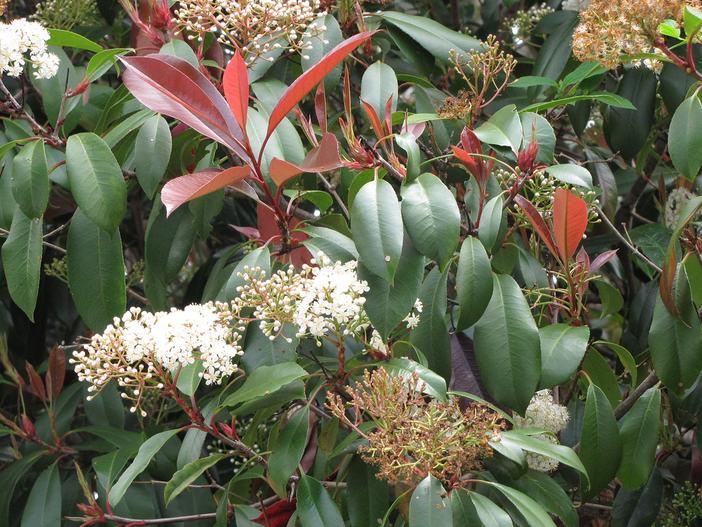Japanese Photinia
(Photinia glabra)
Japanese Photinia (Photinia glabra)
/
/

Forest and Kim Starr
CC BY 2.0
Image By:
Forest and Kim Starr
Recorded By:
Copyright:
CC BY 2.0
Copyright Notice:
Photo by: Forest and Kim Starr | License Type: CC BY 2.0 | License URL: https://creativecommons.org/licenses/by/2.0/ | Uploader: Starr Environmental | Publisher: Flickr



























Estimated Native Range
Summary
Photinia glabra, commonly known as Japanese Photinia, is an evergreen shrub native to the warm temperate and subtropical forests of Japan and regions in Southeast Asia. It typically reaches a height of 10-12 feet (3-3.7 meters) and a width of up to 6 feet (1.8 meters). Japanese Photinia has a dense, rounded form with glossy, leathery leaves that are bright red when young, turning to dark green as they mature. In spring, it produces clusters of small, white flowers that are somewhat showy, followed by red to black fruit that can attract birds.
Japanese Photinia is valued for its striking new foliage, which adds a splash of color to the landscape, and its ease of maintenance. It is often used for hedges, screens, and foundation plantings in urban and suburban landscapes. This shrub prefers full sun to part shade and is adaptable to a variety of soil types, provided they are well-drained. While it is drought-tolerant once established, it benefits from regular watering during dry periods. Popular garden cultivars include ’Rubens’ and ’Red Robin’, which are selected for their vibrant new growth. Potential problems include leaf spot and fire blight, and it may become invasive in some regions outside its native range, so gardeners should check local advisories.CC BY-SA 4.0
Japanese Photinia is valued for its striking new foliage, which adds a splash of color to the landscape, and its ease of maintenance. It is often used for hedges, screens, and foundation plantings in urban and suburban landscapes. This shrub prefers full sun to part shade and is adaptable to a variety of soil types, provided they are well-drained. While it is drought-tolerant once established, it benefits from regular watering during dry periods. Popular garden cultivars include ’Rubens’ and ’Red Robin’, which are selected for their vibrant new growth. Potential problems include leaf spot and fire blight, and it may become invasive in some regions outside its native range, so gardeners should check local advisories.CC BY-SA 4.0
Plant Description
- Plant Type: Shrub
- Height: 10-12 feet
- Width: 5-6 feet
- Growth Rate: Moderate
- Flower Color: White
- Flowering Season: Spring
- Leaf Retention: Evergreen
Growth Requirements
- Sun: Full Sun, Part Shade
- Water: Medium
- Drainage: Fast, Medium, Slow
Common Uses
Bird Garden, Border Plant, Hedges, Low Maintenance, Street Planting
Natural Habitat
native to the warm temperate and subtropical forests of Japan and regions in Southeast Asia
Other Names
Common Names:
Scientific Names: Photinia glabra , Crataegus glabra , Photinia glabra var. typica , Pyrus fokienensis , Pyrus thunbergii , Sorbus glabra
GBIF Accepted Name: Photinia glabra (Thunb.) Maxim.